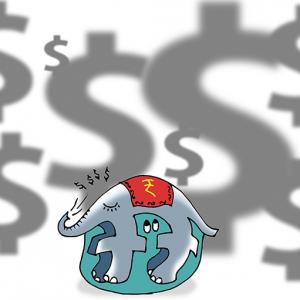The outgoing Chief Economic Advisor will always be remembered for the remarkable passion and purpose he brought to the job, the large imprint he has left on policy making, the big ideas and debates he has floated, and the high level of public debate that he has engendered and fostered, says Sajjid Z Chinoy.

The outgoing Chief Economic Advisor will always be remembered for his remarkable passion, his large imprint on policymaking and the high level of public debate he fostered.
So what do we ask of our Chief Economic Advisors? We ask that they bring passion and purpose to the job.
That they relentlessly push for policies and programmes that are deemed important, wading through the cacophony of markets, resisting the vested interests that relish the status quo, while constantly prodding their (sometimes risk-averse) political masters to forge ahead.
In other words, we want our Chief Economic Advisors (CEA) to be relentless advocates.
But we also expect them to serve as arbiters. In this post-truth world, where anecdote sometimes replaces rigorous analysis, stories often substitute for macro-economic frameworks, and a country’s exceptionalism is occasionally touted to reverse hard-won economic battles, we expect our CEA to push for evidence-based policymaking while simultaneously ensuring that policy-prescriptions are implementable, thereby passing the Duflo-test of the CEA also having to be “a plumber”.
Finally, we expect our CEAs - because of the uniqueness of the office and the latitude that governments offer them - to serve as provocateurs-in-chief - to paint on a big-canvas, think out-of-the-box and push for big, bold ideas that may be politically unfeasible at the time, but which enter the public consciousness and capture the polity’s imagination.
As Dr. Arvind Subramanian finishes his tenure as India’s 16th Chief Economic Advisor it must be underscored - that from our vantage-point - he was the very embodiment of these qualities. And then some.
It was evident that Arvind was all-consumed by the job. Consumed by trying to shape and influence a macro-economic narrative that juxtaposed: (i) deep-seated domestic headwinds (the decade-long slump of private investment and ever-growing mountain of non-performing assets in the banking system), with (ii) the humongous medium-term promise, but near-term operational challenges, of the GST and a (iii) roller-coaster global economy that oscillated from being a tailwind (the collapse in oil prices) to a headwind (episodic fears of a China hard-landing, trade wars and unprecedented developed-economy political risk) with dizzying frequency.
This was not an easy hand to be dealt with but, through it all, Arvind’s guiding principle always appeared to be the same: what best can policy do to address the situation at hand?
And so whether it was an early-morning or late-evening call - and to his credit he often reached out to the analyst community to glean external perspectives - his tireless desire to constantly get to the nub of the issue and appreciate the policy challenge at hand, was truly inspirational.
Much has already been said about Arvind’s block-buster Economic Surveys - which should become standard macro fare in Indian educational institutions, if they haven’t already - for their breath, their ingenious data-sources (satellite imagery to identify untapped tax potential, one-way train tickets to understand inter-state migration) and their ability to frame the issue so as to capture the imagination: from the “twin-balance sheet problem” to the potential of “JAM” to the journey from “crony socialism to stigmatised capitalism” to gender-bias preferences that manifest in odious outcomes such as “missing” women and “unwanted” girls.
For me, however, the Surveys stand out for their prescience and provocation.
As early as the first mid-year review of December 2014, Arvind immediately picked up on the gravity and magnitude of the private investment slowdown and its inextricable link to the “twin-balance sheet” problem involving stressed bank and corporate balance sheets.
Thereafter, survey after survey sounded the clarion call on the policy-imperative of addressing stressed assets as they sought to galvanise the needed political capital to induce a decisive response - which was ultimately forthcoming. Similarly, the early Surveys identified - and lamented - that exports had ceased to be an engine of growth, worrying about how India would maintain strong and sustained growth without a meaningful contribution from exports?
Both concerns have been validated in subsequent years.
But the prescience was juxtaposed with provocation. Arvind’s GST report laid out what an ideal GST should look like, and is always likely to be the template that successive governments strive towards.
Similarly, the discussion on a universal basic income - and the political, economic, social and philosophical trade-offs contained therein - was a masterpiece, eventually arguing for a (quasi) universal basic income to potentially substitute, not complement, the existing byzantine mosaic of leaky subsidies.
Reducing leakages and better targeting the poor will surely please the Mahatma.
Through the years there was also a vibrant public debate between Arvind and the analyst community on a variety of issues but, most notably, on the role of fiscal policy.
Arvind passionately argued for accelerated public investment to fill the lacunae left by private investment, even if it meant a slower pace of fiscal consolidation.
While some of us disagreed on slowing the pace of the Centre’s fiscal consolidation - especially given worsening state deficits under the radar - we could see where Arvind was coming from.
To his credit, as the global cycle turned and macroeconomic stability commanded a premium again, the CEA was the first to advocate caution, arguing repeatedly in the 2017-18 survey for orthodoxy and policy vigilance.
Finally, an enduring theme throughout his tenure was the role of markets versus that of the state. He correctly bemoaned the lack of state capacity even while recognising that, paradoxically, this was accompanied with the over-zealousness of referee institutions, culminating in “stigmatised capitalism”.
Had life come a full-circle for the CEA, who had started by advocating that public investment fill the role vacated by the private sector but came to realise the state itself was hampered by institutional-capacity and incentive-compatibility constraints?
So how should one judge the outgoing CEA’s tenure? By the remarkable passion and purpose he brought to the job, the large imprint he has left on policy making, the big ideas and debates he has floated, and the high level of public debate that he has engendered and fostered.
That will always be Arvind Subramanian’s true legacy.
Mahatma Gandhi famously said, “The best way to find yourself is to lose yourself in the service of others”. Arvind Subramanian certainly found himself over the last four years.
Sajjid Z Chinoy is Chief India Economist at J P Morgan
Photograph: Adnan Abidi/Reuters










